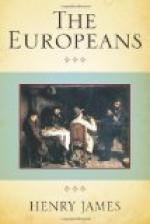“Wait a little, dear child,” said the young man softly, sketching away at his little scraps of paper.
The lady put out her foot; it was very small, and there was an immense rosette on her slipper. She fixed her eyes for a while on this ornament, and then she looked at the glowing bed of anthracite coal in the grate. “Did you ever see anything so hideous as that fire?” she demanded. “Did you ever see anything so—so affreux as—as everything?” She spoke English with perfect purity; but she brought out this French epithet in a manner that indicated that she was accustomed to using French epithets.
“I think the fire is very pretty,” said the young man, glancing at it a moment. “Those little blue tongues, dancing on top of the crimson embers, are extremely picturesque. They are like a fire in an alchemist’s laboratory.”
“You are too good-natured, my dear,” his companion declared.
The young man held out one of his drawings, with his head on one side. His tongue was gently moving along his under-lip. “Good-natured—yes. Too good-natured—no.”
“You are irritating,” said the lady, looking at her slipper.
He began to retouch his sketch. “I think you mean simply that you are irritated.”
“Ah, for that, yes!” said his companion, with a little bitter laugh. “It ’s the darkest day of my life—and you know what that means.”
“Wait till to-morrow,” rejoined the young man.
“Yes, we have made a great mistake. If there is any doubt about it to-day, there certainly will be none to-morrow. Ce sera clair, au moins!”
The young man was silent a few moments, driving his pencil. Then at last, “There are no such things as mistakes,” he affirmed.
“Very true—for those who are not clever enough to perceive them. Not to recognize one’s mistakes—that would be happiness in life,” the lady went on, still looking at her pretty foot.
“My dearest sister,” said the young man, always intent upon his drawing, “it ’s the first time you have told me I am not clever.”
“Well, by your own theory I can’t call it a mistake,” answered his sister, pertinently enough.
The young man gave a clear, fresh laugh. “You, at least, are clever enough, dearest sister,” he said.
“I was not so when I proposed this.”
“Was it you who proposed it?” asked her brother.
She turned her head and gave him a little stare. “Do you desire the credit of it?”
“If you like, I will take the blame,” he said, looking up with a smile.
“Yes,” she rejoined in a moment, “you make no difference in these things. You have no sense of property.”
The young man gave his joyous laugh again. “If that means I have no property, you are right!”
“Don’t joke about your poverty,” said his sister. “That is quite as vulgar as to boast about it.”
“My poverty! I have just finished a drawing that will bring me fifty francs!”




